Govt has completely failed to understand the youth

What is happening in Bangladesh right now is truly unfathomable. Anger, passion and sadness, mixed up with other emotions among the youth of the country, have led to a kind of movement the likes of which we haven't seen in decades. But what are the reasons behind their grievances? The present government has completely failed to understand them. And that failure is leading the government to make one mistake after another.
The anger that has taken hold among the youth, I believe, has been born of three main reasons. The first is the way the economy is operating and the developmental model that this government has adopted and is widely publicising—the youth cannot see any future for themselves in these models. Young people do not see any hope of getting (respectable) jobs that they deserve, according to their abilities. We are seeing jobless growth happen.
The second problem is that whatever employment opportunities exist are mostly in the public sector—be it at government schools, colleges, universities, hospitals or other essential institutions. Thousands of positions in these institutions are left vacant, but the government is not filling them up. Why? Because privatisation is central to its development model. The state of other important government offices is also critical because of the government's neoliberal economic policies.
The third issue is that young people don't believe they will get access to whatever little employment opportunities do exist. That's because all opportunities nowadays have to be bought; they are not granted according to merit. In order to get a job anywhere, you either have to spend money or have connections with the ruling party—in other words, "ruling-party-affiliated quota" has turned into the most dangerous quota. And even outside of that, there are a whole host of other corrupt practices that are taking place.
So, all our young people, whether they are in university, college or even in school, can see a dark future for themselves. Many young people are desperately trying to leave the country. And in the process, sometimes they are betrayed by fraudsters; that is how some end up dying at sea, while others are exploited by criminal brokers and syndicates.
They see the Bangladesh Civil Service (BCS) as the promise of a decent and secure job. But even there, they face 56 percent of quotas, which are limiting their chances, along with question leaks and other forms of corruption.
Young people aren't seeing any way for them to fix the larger economic problems. The only possibility they see is if they can get some reforms made to the quota system. That is what led to the 2018 quota reform movement.
The prime minister's role following the movement then was short-sighted. After getting angry at the protesters, she decided to completely abolish all quotas. That was not the demand of the protesters—they had wanted the system to be reformed. It is only natural that the complete abolishment of quotas wouldn't stand a chance legally, because there are disadvantaged groups in the country who need the quota, and who have a right to it—even the constitution says that.
The government has been saying it can't do anything since it is a matter of the court. But even the court has said that the government can change, reduce or increase the ratio or percentage of the quotas in public jobs if it feels it is necessary. These factors have also influenced the young people and their movement.
Another aspect contributing to the young people's anger is the government's autocratic behaviour—that it can do whatever it wants. That is why young people across the country are in an agitated state right now. If you look at their lives closely, you will see most of them and their families are somehow struggling financially or in other ways. That, too, is influencing their decisions and their actions. Amid their ongoing struggles—either being unable to finance the treatment of their family members or something else—they have been constantly facing torture, intimidation, and/or insults from those affiliated with the ruling party.
To find some relief, they were looking up to the prime minister to take some steps to reform the quota system. Unfortunately, she decided to take the matter completely in another direction. A demeaning comment aimed at them is what triggered them and made them feel even more hopeless. After that, instead of talking to the protesters, the ruling party unleashed its student wing on them. The Awami League general secretary himself was straightforward in saying that BCL would see to the protesters. That is when we saw BCL members—many of whom look older than 30 or even 40 years old—launch a vicious attack on students with rods, sticks and even guns. In places where the BCL couldn't completely run over the students, they hired people and brought them in on trucks and buses to attack the students.
After that, we saw police and BGB being brought in. Why was BGB brought in? BGB troops are supposed to protect the borders.
All these government decisions have increased anger among the students. The way Abu Sayed was killed, as he stood unarmed, with his arms stretched out, when the police shot him, was totally unnecessary. Sayed belonged to a poor family. The people in his village collected money to try and collectively pay for his education. Many people went through so much struggle for him to come this far. And all he wanted was to go even further, using his abilities, which is what he was protesting for.
All the protesters are asking for is a chance to participate in a fair competition. They are not asking for any handouts or any unwarranted favours. For the police to open fire at them for that, and for the ministers to verbally attack them, are unacceptable.
The government refused to understand the anger and feelings that all this incited among the student protesters. And so, they decided to close all the schools and universities. But without addressing their main demand, is it possible for the government to simply shut down all educational institutions and use violence to stop the movement? What does Bangladesh's history tell us?
Bangladesh's history tells us that people in this country have endured a lot of oppression, but they also put up resistance despite all of that. Even BCL leaders were thrown out of campuses by the protesters after the latter were attacked by the ruling party's student wing.
By unleashing such terror upon the students, all the government is doing is displaying its weakness. Even the prime minister has now said that the court will hopefully give a ruling that is satisfying to the protesters. But what about all the unnecessary deaths? Who will take responsibility for them? Hundreds of students have been injured, their families have been hurt, and their education has been hampered. Who will take responsibility for that?
Instead of causing more injury using repressive means, the government needs to listen to the main concerns of the protesters, and take action against those who have attacked and injured them.
Anu Muhammad is a former professor of economics of Jahangirnagar University.
Views expressed in this article are the author's own.
Follow The Daily Star Opinion on Facebook for the latest opinions, commentaries and analyses by experts and professionals. To contribute your article or letter to The Daily Star Opinion, see our guidelines for submission.
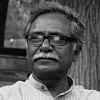
 For all latest news, follow The Daily Star's Google News channel.
For all latest news, follow The Daily Star's Google News channel. 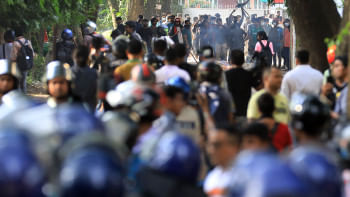
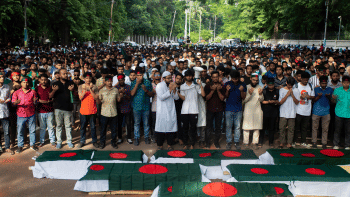
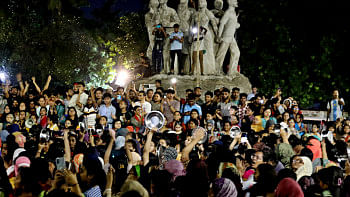


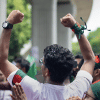
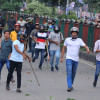

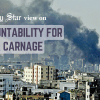



Comments